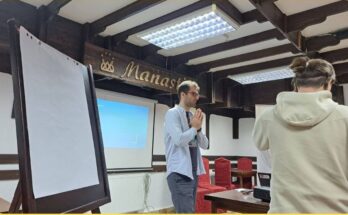“The Young European Federalists are extremely concerned and horrified by the (in)action at the EU’s external border in Greece. In light of the pandemic outbreak of COVID-19 a well organised evacuation would be strongly needed. Instead the past days, culminating in the fire in a refugee camp yesterday, put Europe to shame and are nothing like the vision we have for our future”, says President Leonie Martin. “First, we firmly condemn the Greek government’s violation of international law. According to the United Nations 1951 Refugee Convention, no state has the right to suspend asylum applications according to international laws. These measures ignore the fundamental principles of the EU Charter of Fundamental Rights and the European Treaties. And secondly, this shameful situation only reveals what has been postponed for years: the implementation of a common European migration and asylum policy, in accordance with the principles already stated in the international Charters and in our Treaties. Can you believe we still do not have such a policy?”, continues Martin.
The intergovernmental migration deal with Turkey externalized the human cost of migration outside the external borders of the EU, cooperating with a State with increasingly authoritarian tendencies and creating dependencies up to political extortion. However this is not an isolated case: instead of creating a common European scheme to respond to the so-called ‘migration crisis’, Member States have implemented similar agreements even with non-democratic States such as Libya, with no guarantees on the measures undertaken in the country to prevent migration. Meanwhile, no one is monitoring the Mediterranean Sea anymore. The humanitarian tragedy is continuing, while and where no one is watching.
“We are stuck in a vicious circle”, states Diletta Alese, Member of the Executive Board. “It is clear for everyone that it is one European external border and one common zone. National governments, however, are not taking any step to build up supranational democratic institutions which are able to respond to such humanitarian crises and global phenomena. Instead, governments choose to continue deciding amongst each other, in the field of migration, away from the public eye. We cannot oppose these singular member state solutions firmly enough, which show a disappointing lack of solidarity and cooperation. The public, meanwhile, blames the EU for supposed inaction – and Member States feed this destructive narrative, turned electoral cliché. Exploiting this confusion undermines the popular foundations of the EU, all the while endangering and destroying the values on which the EU should be based”.
The responses of the Union’s institutions have been contradictory: Whereas the President of the European Parliament David Sassoli has publicly committed to protect “the thousands of unaccompanied minors who have arrive at Europe’s shores”, other EU leaders and institutions statements did not prioritise that direction1. The President of the European Commission Ursula von der Leyen thanked Greece for being the “shield” of Europe2 and Eric Mamer, her spokesperson, declared that he could “not [give] a clear yes or no answer” as to whether the use of rubber bullets shot at asylum seekers contradicted international human rights3. The European Council expressed its solidarity with Greece and other Member States due to their efforts to manage the EU’s external borders.
“This is the escalation produced by an intergovernmental system which has betrayed the principles on which Europe should be finally built upon. If the Council really wants to show its solidarity with the most affected Member States, it must truly implement the Dublin III regulation’s reform approved by the European Parliament, which sets a genuine common migration policy in accordance with European values and Human Rights”, adds Martin. “This is the meaning of creating a European federation: to finally establish democracy and the rule of law as core principles of our Institutions. Greece cannot be a shield, because the real threat is the complete absence of political will to concretely respond to global challenges and phenomena that impact daily on citizens’ life, taking a decisive stand towards the future of Europe, towards a European democracy. Who are we protecting us from then?”, concludes Martin.
Background
In early March 2020, the Turkish government decided to open the country’s borders and to no longer prevent asylum seekers and migrants from reaching European soil. Thousands of people, who previously settled in Turkey, consequently tried to enter the European Union in Greece. The Greek police started to push these people back – by firing tear gas, using rubber bullets and batons. In addition to this, Greece announced on Sunday, March 1 2020, the suspension in processing asylum applications for the duration of one month. While this humanitarian crisis is fully unfolding, and whilst fears of a COVID-19 outbreak in the refugee camps grow, a fire broke out yesterday in Moria camp leaving behind one dead child.
In November 2016, the European Parliament approved a reform of the Dublin III regulation by majority, after a long transpartisan discussion. This regulation sets the standards to build a first real common European asylum scheme. The reform, in the form approved by the European Parliament, has never been discussed at the table of the European Council.
See also: Joint Statement on the Turkey Deal, March 2017
Refrences
1. Statement of the President of the European Parliament after his visit at Greek-Turkish border. March 3, 2020
2. Remarks by President von der Leyen. March 3, 2020.
https://ec.europa.eu/commission/presscorner/detail/en/statement_20_380
3. European Commission midday press briefing. March 5, 2020.
https://audiovisual.ec.europa.eu/en/video/I-185919
About JEF Europe
The Young European Federalists (JEF) Europe is a non-partisan youth NGO active with 13.000 members active in more than 35 countries. The organisation strives towards a federal Europe based on the principles of democracy and subsidiarity as well as respect for human rights. JEF promotes true European Citizenship, and works towards more active participation of young people in democratic life.
Press contact:
Diletta Alese
Executive Board Member
diletta.alese@jef.eu
More info
JEF Europe
European Secretariat
info@jef.eu
+32 2 512 00 53




